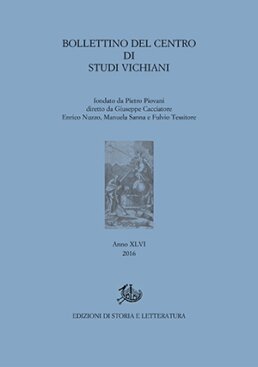Bollettino del Centro di Studi Vichiani Vol. XVLI
ENRICO NUZZO
RELIGION AND ’ORTODOXY’ IN VICO. THEOLOGICAL FOUNDATIONS OF THE HISTORICAL RATIONALITY In discussing again the question of Vico’s ‘orthodoxy’, the essay examines the theological premises of the Vichian conception ofprovidence, and in particular its relation to a centuries-long series of discussions over the attributes of the Christian God, his potestas absoluta and his potestas ordinata. Even if the Neapolitan thinker never engages a in a systematic discussion of divine attributes in their interrelations, the theme runs through the entire Vichian corpus. In Vico’s thought the divine attributes of ’sapientia’ and ‘hobitas’ are pre-eminent, binding God’s will to choose and respect the general principle of the simplicity and immutahility of the historical order. Thus Vico emerges as one of the greatest‘, and certainly most fertile, heirs of the Christian tradition which characterised the divine in terms of its wisdom and goodness. The argument of essay is directed toward showing the correctness of the theological foundations of Vico’s position, but it is not intended to imply that the complex of his ideas and theses was other than marked by great risks: such as on the role of Christianity in the preservation ofnations, on the subject of miracles, etc. Ifin the Christian inspiration of his thought Vico was not a markedly ‘heterodox’ thinker; neither was he an innocuous ‘orthodox’ philosopher.
TADAO UEMURA
VICO’S ZENO: READING LIBER METAPHYSICUS, CHAP. IV: DE ESSENTIIS, SEU DE VIRTUTIBUS. This paper is an attempt of reading of the chapter IV of Liber metaphysicus, which is one of the most mysterious and difficult writings ofVico. In this paper; although it is concluded that the person ‘Zeno’ appeared in it is neither Zeno the Stoic nor Zeno the Eleatic, but a product of Vico’s own imagination derived from his doubt about Aristotle’s arguments against Zeno the Eleatic, a special attention is paid to the affinities between Vico’s argumentation and that of the 17th century Spanish ‘Zenonists’ and that of an essay Systeme nouveau de la nature et de la communication des substances, which Leibniz published anonymously in 1695. Moreover, a minute comparison with Descartes’ theory of motion is presented.
JÜRGEN TRABANT
HOW ‘HISTORIC’ IS THE VICHIAN CIVIL WORLD? The aim of this paper is to discuss the concept of ‘historicity’ in Giambattista Vico’s philosophy. The analysis of the ‘dipintura’ shows that Vico has been misunderstood: he did not discover the historical world as expression of singular existences and he did not use the hermeneutic method as scientific method to study the historical world. ‘History’ is the diachrony of ‘mondo civile’ and the semiotic dimension characterizes it. Consequently, the science that studies it is a meta-semiotics: scientific word cannot indicate the abstract idea beyond language, hut the ensemble of the different points of view on the thing. The new science is not scientific (universality) because of destruction of particular perspectives, as Bacon suggested, but collecting them according to what they have in common. Vico’s science is in balance between universalism and particularism.
INDICE
- Fulvio Tessitore, Giarrizzo, il ‘Centro’ e il «Bollettino del Centro di studi Vichiani» 7
- Enrico Nuzzo, Religione e ‘ortodossia’ in Vico. I fondamenti teologici della razionalità storica 11
- Tadao Uemura, Vico’s Zeno: Reading Liber metaphysicus, Chap. IV: De essentiis, seu de virtutibus 53
- Jürgen Trabant, Quanto è ‘storico’ il mondo civile vichiano? 75
SCHEDE E SPUNTI
- Claudio D’Errico, L’origine dell’umano in Vico e Durkheim 93
- Armando Mascolo, L’instabilità del reale. La ‘crisi’ del barocco nella visione di Vico e Graciàn 111
- Mauro Gambini de Vera d’Aragona, Il diritto feudale in Francesco d’Andrea» 129
NOTE CRITICHE
- Raffaele Ruggiero, Vico e la semantica giuridica 171
- Roberto Evangelista, Storia e Scienza. Le prospettive degli studi vichiani 176
- Raffaele Ruggiero, Il viaggio di Vico in Europa 184
- Stefano Santasilia, Polifonia del senso. Note in margine ai ‘conflitti della ragione’ 187
- Alessia Scognamiglio, Metodologie degli studi vichiani 194
- Roberto Evangelista, Nuovi sentieri di studi vichiani. Nota sul Convegno «The Vico Road» (Parigi, 13-14 gennaio 2015) 198
- Pina Totaro, «L’affare delle Lingue và sempre unito con gl’interessi della Religione». A proposito di una recente edizione delle Considerazioni di Biagio Garofalo 203
- Maurizio Cambi, Considerazioni a proposito di un libro su Montaigne» 209
AVVISATORE BIBLIOGRAFICO 213
